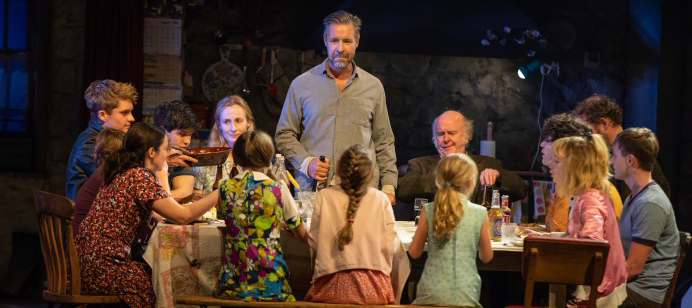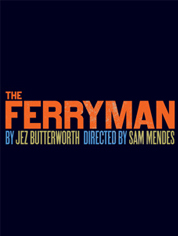

The Ferryman
Opening Night: October 21, 2018
Closing: July 7, 2019
Theater: Bernard B. Jacobs
Northern Ireland, 1981. The Carney farmhouse is a hive of activity with preparations for the annual harvest. A day of hard work on the land and a traditional night of feasting and celebrations lie ahead. But this year they will be interrupted by a visitor. Following unanimous, five-star critical acclaim and a thrice-extended, year-long run in London, Jez Butterworth’s The Ferryman has finally arrived on Broadway. This “fiercely gripping play” (Ben Brantley, The New York Times) is directed by Academy® and Tony Award® winner Sam Mendes and has won three Olivier Awards, including Best New Play and Best Director; three Evening Standard Theatre Awards, including Best Play and Best Director; three WhatsOnStage Awards, including Best New Play and Best Director; and was named the Best New Play at the Critics’ Circle Theatre Awards.
BUY TICKETSREAD THE REVIEWS:
October 22, 2018
Wisdom around town murmurs that you shouldn’t read anything about The Ferryman before seeing The Ferryman, Jez Butterworth’s new three-hour-and-change family thriller which opened Sunday at Broadway’s Jacobs Theatre. Given Butterworth’s armrest-grabber of an ending, wisdom would be correct (although it would technically be just as correct about every other new play). But wisdom, increasingly intent on abating art into buzz, would also leave out most of what gives The Ferryman its most beautiful ingredients. The Ferryman grips you, that much is true. Save for a brief prologue set in a back alley, the action in the latest piece from Butterworth (Jerusalem, The River) bounces off the walls of a country farmhouse that’s equally mammoth and claustrophobic (a remarkable design by Rob Howell). If, once you’re in this house, once you’ve met the swearing, enchanting Carney family, you find yourself quickly swept up in the action of a clan of endlessly busy farmers and daughters, of characters drawn remarkably quickly and confidently from bickering conversations around the hearth and rounds of memory from indomitable family elders, if you find that the legend of this family builds in your heart and mind in equal parts with the dread of some unspoken but surely forthcoming haunting, then consider that a credit to Butterworth’s text in the hands of director Sam Mendes.
READ THE REVIEWOctober 21, 2018
Jez Butterworth’s “The Ferryman,” which opened with a howling roar of cacophonous humanity Sunday night on Broadway, packs more juicy and prophetic Anglo-Irish storytelling into a fantastic single night than any cable drama upon which you might ever hope to binge. For your tiny screens do not hold 21 live actors, a seeming bushel of live rabbits, a scrawny-necked, Tony Award-seeking goose and a wide-eyed little human baby, surely worried stiff about what the riven Irish family into which he has been plopped portends for his own life.
READ THE REVIEWOctober 21, 2018
Glorious is not too strong a word for director Sam Mendes’s production of Jez Butterworth’s heartbreaker of a play, “The Ferryman.” Flawless ensemble work by a large and splendid cast adds depth to the characters in this sprawling drama that is at once a domestic calamity and a political tragedy. The year is 1981 and Ireland has been partitioned for more than half a century. Ten Republican participants in the Irish Hunger Strikes would die that year, beginning with the political martyr Bobby Sands. More than 100,000 people would attend his funeral in Northern Belfast, causing Sinn Fein, the political wing of the Provisional IRA, to recruit new members and grow in strength. Soon, the bombings would begin. For now, though, thoughts of the Troubles are well out of mind in the large Carney household, barely contained in the heavily rustic setting designed with impressive visual integrity by Rob Howell (set) and Peter Mumford (lighting). It’s harvest time, the most solemn and joyous time of the year in rural Ireland, where native roots go deep. From “Jerusalem,” a previous Broadway transfer, we already know that Butterworth traces native roots all the way back to ancient times. Here, Uncle Patrick Carney, the family patriarch played with great authority and grand humor by Mark Lambert, takes a broad view of these connections.
READ THE REVIEWOctober 22, 2018
In the great Irish tradition of vivid story-telling comes “The Ferryman.” Jez Butterworth’s richly stocked play, set in Northern Ireland during the bitter IRA troubles, is a gorgeous sprawling yarn that encompasses the entire spectrum of human existence: Life and death, love and hatred, compassion and violence. It’s 1981. Quinn Carney is a married farmer with seven children and a bunch of relatives all living under one roof. When we first meet, they are the picture of an idyllic rural family. Happy and hardworking for the most part, they all seem to get along quite comfortably. Even cranky Aunt Pat has a respected place in their hearts. But a prologue earlier on signals something sinister is afoot, and indeed the story takes its sweet time before the festering seeds take root. At 3 hours and 15 minutes, the heavily plotted saga may seem long, but on Robb Howell’s wonderfully evocative farmhouse setting, the story is so engrossing, the characters so engaging, and the suspense so foreboding, you’ll be left wanting more.
READ THE REVIEWOctober 21, 2018
When the banshees of the past come calling in Jez Butterworth’s fearsome The Ferryman, you can bet their shrieking will be blood curdling. Directed by Sam Mendes (Skyfall) and opening tonight on Broadway at the Bernard B. Jacobs Theatre, the Olivier-award-winning play is a stunner, stitching familiar elements of Irish pastoral drama, The Troubles history and Butterworth’s magical, myth-tapping touches into something as powerful as anything on today’s stage. If nothing else – and, believe me, there is much, much else – The Ferryman cements the playwright’s status as an unrivaled ending-writer, as this tale of a sprawling Irish family reckoning with decades, even centuries, of violence and division spirals to a conclusion that recalls, in its own way, those earth-pounding, theater-shaking footsteps of unseen Giants that closed Butterworth’s transcendent Jerusalem in 2009.
READ THE REVIEWOctober 21, 2018
No matter what sort of spread you’ve planned for your Thanksgiving dinner, it won’t be a patch on the glorious feast that has been laid out at the Bernard B. Jacobs Theater. That’s where Jez Butterworth’s thrilling new play “The Ferryman” opened on Sunday night, with a generosity of substance and spirit rarely seen on the stage anymore. There is, for the record, a whopping celebratory meal at the center of this endlessly vibrant work, directed with sweeping passion and meticulous care by Sam Mendes. Its main course is a goose, which has figured as a living creature in earlier scenes, and the repast appears to be more than enough to feed the 17 revelers gathered at an overladen table in rural Northern Ireland in 1981.
READ THE REVIEW





















